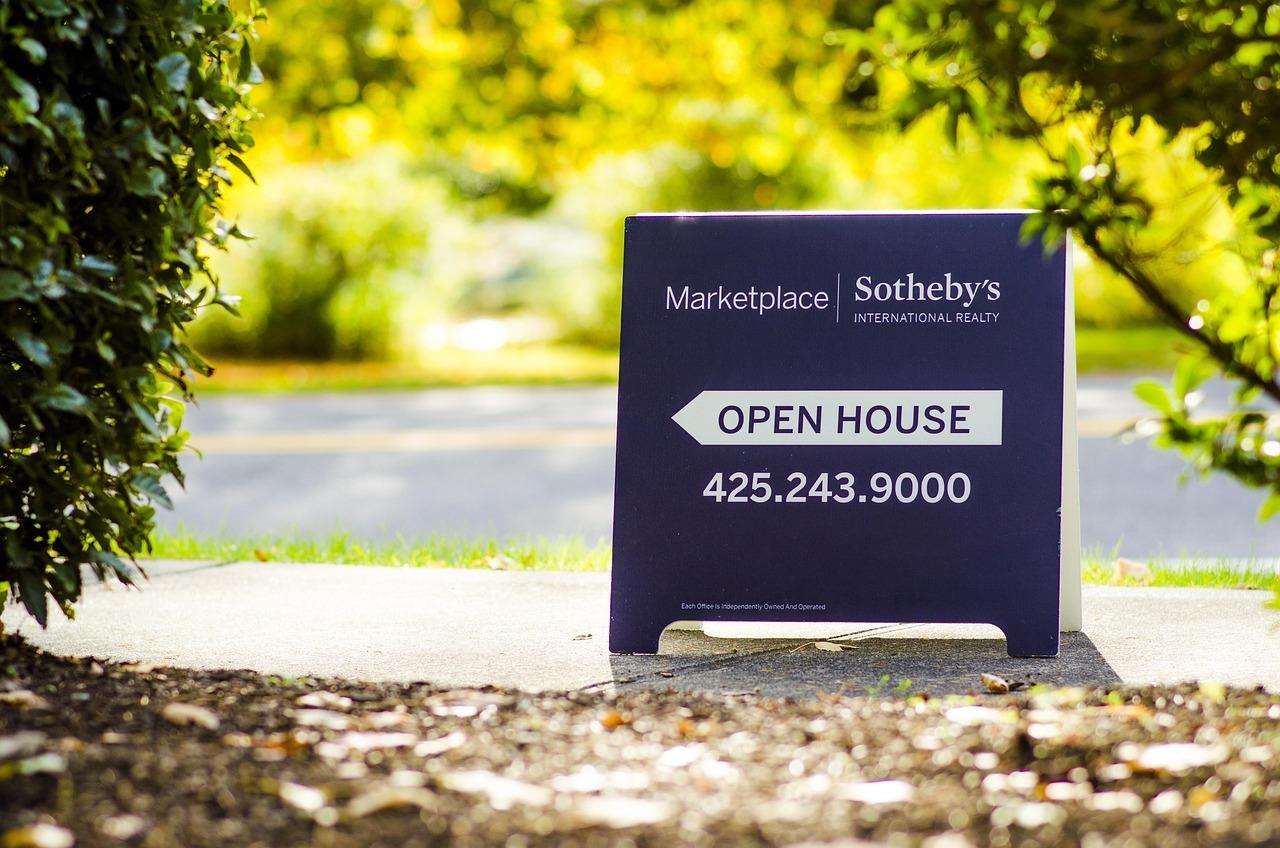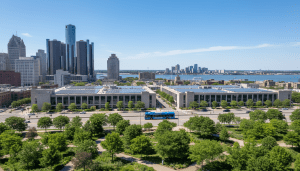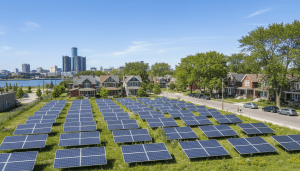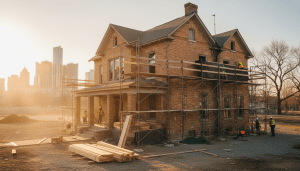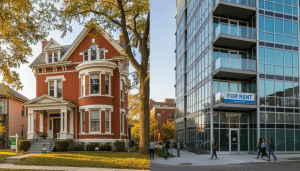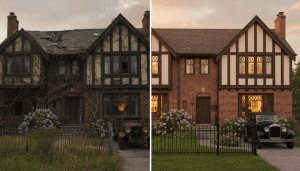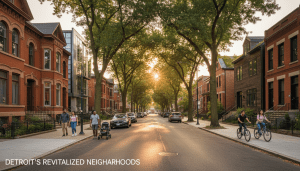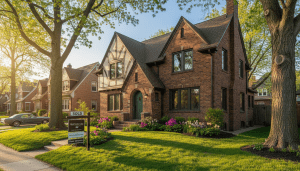Detroit homebuyer programs 2025 are designed to make homeownership more accessible, affordable, and sustainable. Whether you’re a first-time buyer, a returning resident, or an investor revitalizing Detroit neighborhoods, there’s never been a better time to take advantage of Michigan’s growing list of financial incentives.
In this ultimate guide, we’ll explore every major Detroit homebuyer program, including down payment assistance, affordable mortgage options, tax credits, and local grants. You’ll also learn how to qualify, apply, and combine these incentives to save thousands on your next home purchase.
Why Detroit Is the Smartest City to Buy a Home in 2025
Detroit’s housing market continues to offer unbeatable value. Median home prices remain around $110,000, roughly one-third of the national average, while revitalized neighborhoods like Bagley, Jefferson-Chalmers, and East English Village offer strong appreciation potential.
Key Market Highlights (2025):
| Metric | Detroit | National Average |
|---|---|---|
| Median Home Price | $110,000 | $346,000 |
| Average Mortgage Rate | 6.3% | 6.8% |
| Average Down Payment | $9,500 | $23,000 |
| Home Price Growth (YoY) | +4.8% | +2.3% |
Detroit’s affordability, paired with its expanding incentive ecosystem, makes it a top choice for new homeowners seeking long-term equity growth.
The Top Detroit Homebuyer Programs for 2025
Here’s a comprehensive breakdown of the most impactful homebuyer programs available in Detroit this year:
1. MSHDA Down Payment Assistance (MI Home Loan Program)
The Michigan State Housing Development Authority (MSHDA) offers one of the most popular statewide homebuyer programs.
Program Highlights:
Up to $10,000 in down payment assistance.
Forgivable after 5 years of homeownership.
Fixed-rate 30-year mortgages through approved lenders.
Eligibility:
Household income below $99,000.
Minimum credit score of 640.
Home purchase price capped at $224,500 (Wayne County).
Best For: First-time homebuyers and repeat buyers who haven’t owned a home in 3+ years.
Learn more: MSHDA Homeownership Programs
2. Detroit Home Mortgage Program
The Detroit Home Mortgage initiative bridges the gap between low property appraisals and actual renovation costs — a key barrier in older Detroit neighborhoods.
Program Features:
Combined first + second mortgage covering full renovation value.
Available through partner banks (Huntington, Flagstar, Liberty Bank).
Designed to restore undervalued homes that fail traditional appraisals.
Example:
A buyer purchasing a $90,000 property needing $25,000 in repairs can finance the full $115,000 at affordable fixed rates.
Best For: Buyers investing in older Detroit homes needing rehab work.
3. The Detroit Home Repair Fund
Administered by the Gilbert Family Foundation and Rocket Community Fund, this program provides home repair assistance to help residents stabilize aging properties.
Program Highlights:
Up to $25,000 in home repairs per eligible household.
Focused on roofing, plumbing, electrical, and HVAC needs.
Priority given to longtime Detroit residents and seniors.
Eligibility:
Owner-occupants within Detroit city limits.
Household income under 200% of the federal poverty level.
Impact:
Over 1,000 homes repaired since 2022, supporting neighborhood revitalization.
Learn more: detroithomerepairfund.org
4. Neighborhood Enterprise Zone (NEZ) Tax Abatement
Detroit’s NEZ Program reduces property taxes for homeowners investing in designated revitalization areas.
Benefits:
Up to 15 years of property tax reduction.
Applies to both newly built and rehabilitated homes.
Average savings: $500–$1,500 per year.
How to Apply:
Confirm property eligibility at detroitmi.gov/NEZ.
Submit NEZ certificate before purchase closing.
Best For: Buyers renovating older homes in targeted districts.
5. Detroit Land Bank Authority (DLBA) Buyer Programs
The Detroit Land Bank Authority continues to offer affordable homes through its Own It Now and Auction programs.
Key Details:
Homes starting as low as $1,000–$10,000.
Renovation grants available for qualified buyers.
Focused on bringing vacant properties back into use.
Steps to Apply:
Create an account at buildingdetroit.org.
Browse active listings and auctions.
Complete renovation compliance and closing documents.
Best For: DIY buyers, investors, and community-focused homeowners.
6. Federal First-Time Buyer Benefits (2025 Updates)
Detroit buyers can still take advantage of several national programs offering flexible credit and down payment options:
| Program | Minimum Down Payment | Credit Score | Notes |
|---|---|---|---|
| FHA Loan | 3.5% | 580+ | Low down payment, easy qualification |
| VA Loan | 0% | N/A | For military and veterans |
| USDA Loan | 0% | 640+ | Rural/suburban buyers |
| Fannie Mae HomeReady | 3% | 620+ | Income-based qualification |
How to Qualify for Detroit Homebuyer Assistance
Eligibility varies by program, but these are universal requirements most applicants must meet:
Basic Qualification Checklist:
Must be a U.S. citizen or permanent resident.
Must occupy the property as a primary residence.
Must meet local income and price limits.
Must complete a homebuyer education course.
Must work with an approved lender or partner organization.
Pro Tip: Combining multiple programs — such as MSHDA assistance with NEZ tax abatements — can dramatically reduce upfront and long-term costs.
Detroit Neighborhoods Offering the Best Incentives
Certain Detroit neighborhoods provide additional local support through grants or community-based programs:
| Neighborhood | Incentive Type | Typical Savings |
|---|---|---|
| Bagley | NEZ + MSHDA combo eligible | $12,000–$15,000 |
| East English Village | Land Bank + Repair Fund | $10,000–$20,000 |
| Midtown | New construction tax abatement | $8,000+ |
| Jefferson-Chalmers | Federal FHA/NEZ overlap | $5,000–$10,000 |
Each area offers a unique mix of affordability and appreciation potential — making it ideal for both first-time homeowners and investors.
Steps to Apply for Detroit Homebuyer Programs
1. Check Eligibility — Visit official portals (MSHDA, Detroit Land Bank, etc.).
2. Get Pre-Approved — Work with an approved mortgage lender.
3. Take a Homebuyer Education Course — MSHDA or HUD-certified programs are accepted.
4. Submit Applications Early — Some grants have limited annual funding.
5. Partner with a Local Realtor — Use agents experienced in Detroit incentive programs.
How These Programs Impact Detroit’s Housing Revitalization
The success of Detroit’s 2025 homebuyer programs goes beyond affordability — it’s rebuilding entire communities.
By converting vacant homes into owner-occupied properties, the city has reduced blight and increased neighborhood stability.
Since 2015, more than 13,000 homes have been restored or purchased through incentive programs, injecting $2.1 billion into the local housing economy.
Frequently Asked Questions
1. Can I combine multiple Detroit homebuyer programs?
Yes. Many buyers combine MSHDA down payment assistance with NEZ tax abatements and local grants.
2. How long does it take to close on a home using these programs?
Typically 45–60 days, depending on documentation and inspection requirements.
3. Do I have to stay in the home for a certain number of years?
Most programs require you to occupy the home for at least five years to retain full benefits.
4. Are these programs only for first-time buyers?
Not always. Some, like the Detroit Home Mortgage, are available to repeat buyers who meet criteria.
Detroit homebuyer programs 2025 are transforming access to homeownership for thousands of residents. By combining state, local, and federal resources, Detroit is building a new generation of homeowners — one that’s diverse, informed, and committed to long-term community success.
For anyone ready to buy, now is the moment: with low home prices, active grants, and major city revitalization underway, Detroit is more than a housing market — it’s a movement toward sustainable growth and opportunity.
